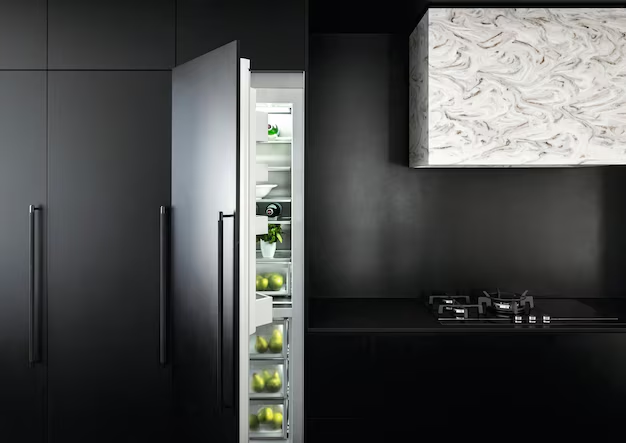Discovering the Quietest Refrigerators: The Ultimate Guide to Soundless Kitchen Living
Imagine a scenario where your fridge hums so loudly that it interferes with the serene silence of your night or the harmony of family conversations. A noisy refrigerator can disrupt the tranquility of your home, prompting many to seek out quieter options. But what does it mean for a refrigerator to be "quiet," and what should you be looking for if silence is golden in your kitchen? Let's explore how to find the quietest refrigerator, ensuring peace and calm in your culinary haven.
Why is Refrigerator Noise an Issue?
Refrigerator noise is more than just an irritation—it's an unwelcome guest in the daily rhythms of your home. The hum or buzz often associated with these appliances can stem from several factors:
- Compressor Noise: The compressor is often the primary noise source, working to maintain the fridge's internal temperature.
- Fan Operations: Fans circulate air to ensure even cooling; a worn-out or misaligned fan can add to noise levels.
- Defrost Cycles: The automatic defrost systems in many modern fridges may produce clicking sounds.
Understanding these sources can help you make informed decisions when prioritizing quietness in your next fridge purchase.
Factors to Consider When Choosing a Quiet Refrigerator
Purchasing a quiet refrigerator involves evaluating several features, ensuring your choice supports the peaceful ambiance you desire in your home. Here are key factors to consider:
1. Compressor Technology
Inverter Compressors are renowned for their quieter operation. Unlike traditional single-speed compressors that frequently turn on and off, inverter compressors adjust to the necessary speed, minimizing noise and also offering energy efficiency. The result is a gentle hum instead of loud intermittent noises.
2. Size and Build
Larger refrigerators with more significant body insulation often provide better noise control. Also, the material of the fridge plays a role; those made with stainless steel or other sturdy finishes can better dampen sound. Ensure that the refrigerator is designed with soundproofing materials or features.
3. Placement Options
The location of your refrigerator impacts its noise perception. Built-in models might help conceal sound better than standalone versions. Installing your fridge in a recessed area or ensuring it's not directly against the wall can also diminish noise reflection.
4. Brand Reputation
Certain brands are well-known for manufacturing quiet refrigerators. Consider those with positive consumer feedback on the quiet operation, often highlighting technology improvements and quality components.
5. Decibel Rating
Refrigerators often come with a decibel specification. A lower decibel rating means a quieter appliance. While it's not always listed on product labels, seeking out consumer reviews or manufacturer descriptions that mention decibels is helpful.
Tips for Managing Refrigerator Noise
If buying a new refrigerator isn't an immediate option, there are several things you can do to reduce the current noise levels:
- Level the Fridge: Ensuring the refrigerator is balanced can diminish noise. An unsteady surface may cause excessive vibration.
- Check and Clean: Dirty condenser coils or blocked airflow can make the appliance work harder. Regular cleaning can mitigate excessive noise.
- Soundproofing Accessories: Consider using mats or pads designed to absorb sound, placing them beneath the fridge to reduce vibrations.
Popular Quiet Refrigerator Features
When assessing potential refrigerators, here are some features often linked with quieter performance:
Advanced Refrigeration Technologies
Refrigerators incorporating technologies like multi-airflow systems and linear compressors tend to run more quietly and efficiently. Multi-airflow ensures a consistent temperature, reducing compressor strain, while linear compressors operate at variable speeds to minimize noise.
Energy Efficiency
Energy-efficient refrigerators tend to be quieter. The less energy it requires, the less strain on the components, leading to reduced noise. Look for Energy Star certified appliances, which often emphasize quiet operation alongside efficiency.
Smart Features
Many modern refrigerators include smart features that allow users to monitor and control the appliance remotely. This tech can notify you of issues before they impact performance, including noise disturbances that could arise from malfunctioning parts.
Summary: Your Path to a Quieter Kitchen 🌿
To summarize, finding the quietest refrigerator for your kitchen involves multiple considerations:
- Choose a model with advanced compressor technology, prioritizing options like inverter compressors for smoother operation.
- Consider the size and build, favoring larger, insulated models.
- Focus on placement, opting for built-in models or strategic positioning.
- Check for low decibel ratings where available, and read consumer reviews for insights into operational noise.
- Streamline noise control with maintenance tips, addressing common noise sources like imbalance or dirt.
Finding the right refrigerator may require a blend of technological insight and practical application, but the benefit of a quieter home makes the effort worthwhile.
Conclusion: The Tranquility of Choice Awaits
Selecting the quietest refrigerator can transform your home environment, giving you the subtle but profound comfort of silence in a bustling kitchen. Understanding the dynamics of refrigerator noise, technology options, and placement allows you to prioritize soundless living. So, as you stand before the options—listening instead for an almost imperceptible, harmonious hum—know that your choice contributes to the calming tranquility every home deserves. 🌼
Embrace the possibilities and revel in the serene atmosphere of a quiet kitchen space.

